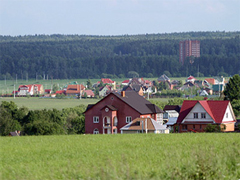Search
Login
Some clarifications on the "summer amnesty"
After the adoption of the Law of the Russian Federation "On registration of rights to real estate and transactions with it", all real estate is subject to state registration. Only after that it becomes property with which you can make various transactions. But what about real estate?
First of all, this is a land plot. And everything that is firmly connected with it and cannot be moved without a significant violation of the design. This is certainly a home. But is real estate, for example, a household shed, a garage, etc., considered? The law says only that real estate includes buildings and structures. In the vast majority of cases, real estate is recognized as a building that has a "capital" foundation. If the household unit or the “shell” can be moved using simple methods, they are not considered real estate.
When registering a new house on their own land, they present a certificate of ownership of land and a certificate of BTI.
And what to do with the buildings erected "under King Pea"? Until you are going to make any commercial transactions with them, you can not puzzle over it. Now, if you have to divide the cottage between the heirs or sell, then you have to register it. And at the same time "emergency situations" are possible. For example, one woman decided to sell her plot with an old house. Privatized the land, called on BTI workers to evaluate the buildings. However, during the use of the cottage, its area slightly increased due to two verandas, in addition, a porch was attached to it. For some reason, the appraiser demanded to demolish all the extensions, explaining that they were built illegally, although in those days there were no restrictions on the reconstruction of the house or its complete reconstruction. The only thing they could blame in this case was the violation of the ban on unauthorized buildings.
Nevertheless, in this case, BTI is not the body that has the right to dispose of what is subject to demolition and what is not. And you can literally evaluate everything, down to the chairs on the veranda.
In many letters, summer residents and gardeners with experience ask if permission is required to demolish the old house and build a new one. If the house belongs to you and is located on your own property, you do not need to receive any permissions from anyone (except in those rare cases when the building is a monument of culture or architecture). Your property is in your hands and cards.
Sooner or later, most landowners build some kind of building on them. Who is a shack, who is a multi-storey palace, depending on what opportunities they have. Previously, all this was called a summer residence, and rarely anyone thought about the formalities of registration. Now that the country house and the land on which it is built are worth a lot of money, more and more summer residents understand that it is better to spend several months on registration now than years on litigation later.





